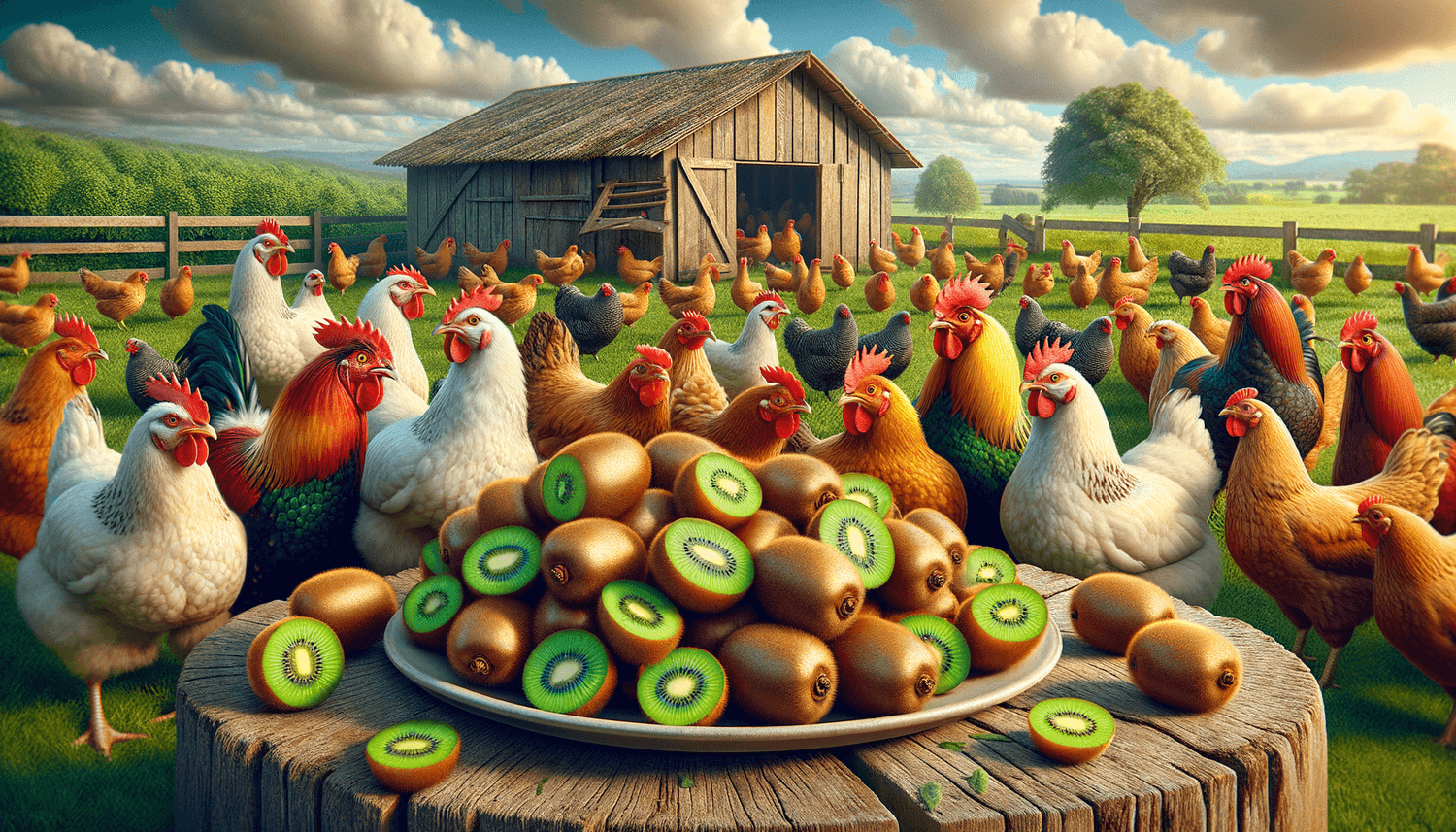Welcome to the cluckin’ good world of backyard chicken diets, where we explore the myriad of foods our feathered friends can consume, with a feather-lickin’ tasty focus on kiwi fruit! Can chickens eat kiwi, you ask? Well, don’t count your eggs before they’re hatched – in this post, we’ll talk about whether kiwi makes for a peck-tastic treat or a no-go nibble. We’ll also dish up the scoop on the importance of a balanced diet, get crackin’ on the benefits and potential risks of kiwi for your chicks, and even dive into the nutritional value, all while teaching you how to prepare this juicilicious fruit for your beloved brood. So join us as we strut through the kiwi wonderland with our cluckin’ cool companions!
Can chickens eat kiwi?
Yes, chickens can indeed eat kiwi and it is safe for them to do so. Kiwi is a nutritious treat that can provide your flock with essential vitamins and minerals, including vitamin C, potassium, and fiber. However, it’s important to keep kiwi consumption in moderation and not let it become a primary part of their diet, as chickens still require a balanced diet to maintain optimal health.
A balanced diet for chickens
Just like humans, chickens also require a well-balanced diet to thrive and stay healthy. The primary source of nutrition for your feathery friends should be high-quality chicken feed, formulated to provide them with all the necessary nutrients, vitamins, and minerals they need for a happy, cluckin’ life. Chicken feed should make up around 80-90% of their daily intake, ensuring that their core nutritional requirements are met.
The remaining 10-20% of a chicken’s diet can be made up of delightful treats like fruits and vegetables, which not only offer additional health benefits, but also add variety and enjoyment to their day. While these treats are a fun and tasty way to spoil your backyard flock, it’s important to remember that their main source of nutrition should still be chicken feed, which is specifically designed to cater to their unique dietary needs. Treats like kiwi and other fruits can help supplement their diet, but should not replace their staple feed.
Nutritional value of kiwi for chickens.
Kiwi does in fact provide nutritional value when fed to chickens. This fuzzy fruit is packed with vitamins, minerals, and other essential nutrients that can benefit your backyard flock when offered in moderation. One of the most notable nutrients found in kiwi is vitamin C, a powerful antioxidant that helps support the immune system, promotes healthy skin and feathers, and aids in the development and repair of body tissues. Your chickens will surely enjoy this fruity treat while reaping its health benefits.
Furthermore, kiwi is a great source of potassium, which plays a key role in regulating muscle function, fluids balance, and overall body metabolism. As chickens, just like humans, rely on proper muscle function and balanced fluid levels for optimal health, potassium is an important part of their diet. In addition, kiwi contains dietary fiber which can aid digestion and help maintain a healthy gut in your birds.
Besides its nutrient-dense profile, kiwifruit also offers hydration to your chickens, as it has a high water content. This can be particularly beneficial during hot summer days when your flock needs a little extra help to stay hydrated. Of course, it is essential to provide clean, fresh water to your chickens at all times, but occasional treats like kiwi can serve as a bonus source of hydration on warmer days.
Nutrition table of kiwi for chickens.
| Information | Description |
|---|---|
| Nutritional Value | Rich in vitamin C, potassium, fiber, and other essential nutrients |
| Suggested Serving Size | A small slice per chicken, keeping treats to 10-20% of their diet |
| Safe Feeding Practices | Moderation is key, always prioritize high-quality chicken feed |
| Preparation | Remove skin and seeds; dice or slice into small, manageable pieces |
| Potential Risks | Overconsumption can lead to digestive issues and nutrient imbalance |
| Hydration | High water content in kiwi can provide additional hydration |
| Digestion | Fiber content in kiwi fruit can help support healthy digestion |
| Seasonal Availability | Typically available year-round, with peak season from October to April |
| Other Benefits | Can promote immune system function due to its antioxidant properties |
Preparing kiwi for your chickens
Feeding kiwi to your chickens is simple, but it is important to ensure it is prepared properly so your flock can enjoy it safely. To start, remove the fuzzy outer skin of the kiwi, as it can be tough for your chickens to digest. Next, you should remove the seeds as well, because chickens can choke on them. Once the skin and seeds are removed, dice or slice the kiwi into small, manageable pieces that are easy for your chickens to peck at and consume.
Alternatives to kiwi
If you’re looking for other fruits and vegetables that your chickens can enjoy besides kiwi, there are many options. Some popular and healthy choices you can consider include apples, bananas, blueberries, and leafy greens like spinach, kale, or lettuce. Remember, always introduce new treats in moderation, and be sure to research any food items before feeding them to your backyard flock to ensure they are safe and healthy choices.
Monitoring your chickens
As with any new treats or changes to your chickens’ diet, keep a keen eye on your flock to monitor how they are responding to the introduction of kiwi. If you notice any unusual behavior or signs of digestive upset, stop feeding kiwi and consult with your veterinarian to address any potential health concerns. By remaining vigilant and providing a balanced diet, you’ll be well on your way to raising a happy and healthy backyard flock.

















